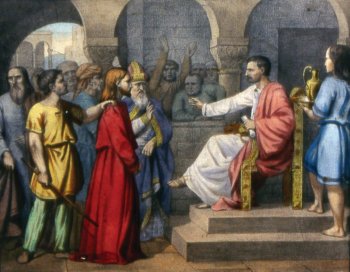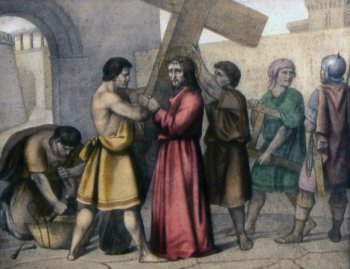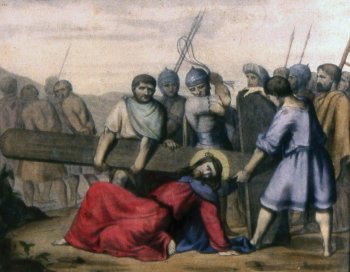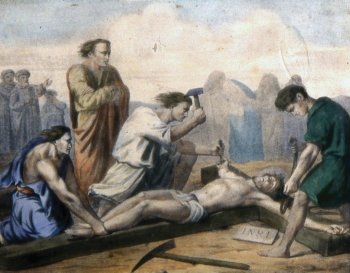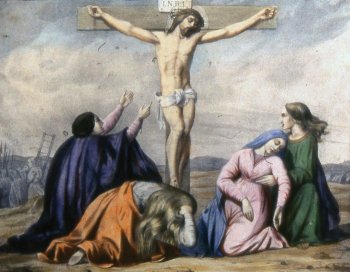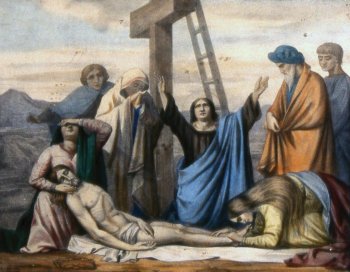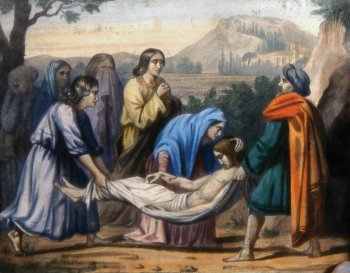A Reading from the Prophet Isaiah 53:5
He was wounded for our transgressions, he was bruised for our iniquities; upon him was the chastisement that made us whole, and with his stripes we are healed.
He who holds the lights of heaven in his divine hand and before whom the powers of heaven tremble: see him falling to the ground, without protecting himself, under the heavy yoke of the Cross.
He who brought peace to the world, wounded by our sins, falls under the burden of our guilt.
"O ye faithful, behold our Saviour as he moves forward along the path to Calvary. Oppressed by bitter sufferings, his strength abandons him. Let us go to see this incredible event that surpasses our understanding and defies description. The foundations of the earth were shaken and a dreadful fear took hold of those who were present when their Creator and God was crushed under the weight of the Cross and let himself be led to death, for love of all humanity" (Chaldean Liturgy).
Lord Jesus,
raise us from our own falls,
lead our wandering spirit
back to your Truth.
Do not allow human reason,
which you created for yourself,
to be satisfied with the partial truths
of science and technology
without seeking to pose the fundamental questions
of the meaning of our existence
(cf. Porta Fidei, 12).
Grant, Lord,
that we may open ourselves to the action of your Holy Spirit,
so that he may lead us to the fullness of Truth.
Amen.
IV Station: Jesus meets his mother
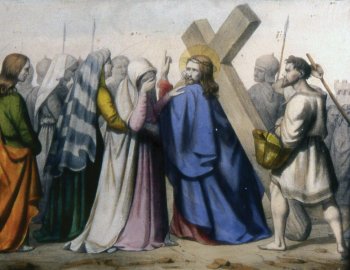
A Reading from the Holy Gospel according to Luke 2:34-35, 51b
Simeon blessed them and said to Mary his mother, "Behold, this child is set for the fall and rising of many in Israel, and for a sign that is spoken against (and a sword will pierce through your own soul also), that thoughts out of many hearts may be revealed." His mother kept all these things in her heart.
Wounded and suffering, carrying mankind’s Cross, Jesus meets his mother and, in her face, all mankind.
Mary the Mother of God was the first disciple of the Master. In accepting the Angel’s message, she encountered the Incarnate Word for the first time and became the Temple of the living God. She met him without understanding how the Creator of heaven and earth could have wanted to choose a young girl, a fragile creature, in order to become incarnate in this world. She met him in a constant search for his face, mediating on the word in the silence of her heart. She thought she was seeking him, but in reality, it was he who was seeking her.
Now he encounters her as he carries the Cross.
Jesus suffers on seeing his mother suffer, as does Mary on seeing her Son suffer. But from this shared suffering a new humanity is born. "Salam to you! We implore you, holy and glorious ever-Virgin, Mother of God, Mother of Christ. Let our prayer rise up before your beloved Son, that he may forgive our sins" (Theotikon from the Horologion, Al-Aghbia, 37).
Lord Jesus,
in our families we too experience
the sufferings caused to children by their parents
and to parents by their children.
Lord, grant that in these difficult times
our families may be places of your presence,
so that our sufferings may be turned to joy.
Support our families
and make them oases of love,
peace and serenity,
in the image of the Holy Family of Nazareth.
Amen.
V Station: Simon of Cyrene helps Jesus to carry the Cross
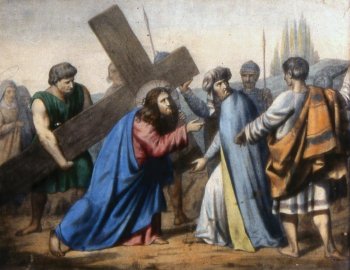
A Reading from the Holy Gospel according to Luke 23:26
As they led him away, they seized one Simon of Cyrene, who was coming in from the country, and laid on him the Cross, to carry it behind Jesus.
Jesus’ meeting with Simon of Cyrene took place in silence, providing us with a lesson for our lives: God does not want suffering and he does not accept evil. The same is true of the human being. But suffering, accepted in faith, is transformed into a path of salvation. Then we accept it as Jesus did, and we help to carry it as Simon of Cyrene did.
Lord Jesus,
you have involved man in the carrying of your Cross.
You have invited us to share your sufferings.
Simon of Cyrene is like us
and he teaches us to accept the Cross
that we encounter on the paths of life.
Following your example, Lord,
we too carry the Cross
of suffering and illness today,
but we accept it because you are with us.
It can nail us to our chair,
but it cannot prevent us from dreaming;
it can obscure our vision,
but it cannot touch our conscience;
it can deafen our ears,
but it cannot prevent us from listening;
it can bind our tongue
but it cannot suppress our thirst for truth;
it can weigh down our spirit,
but it cannot rob us of our freedom.
Lord,
we want to be your disciples
so as to carry your Cross every day;
we will carry it with joy and hope
because you are carrying it with us,
because you have triumphed over death for us.
We give you thanks, Lord,
for every sick or ailing person
who knows how to bear witness to your love,
and for every "Simon of Cyrene"
whom you place on our journey.
Amen.
VI Station: Veronica wipes the face of Jesus
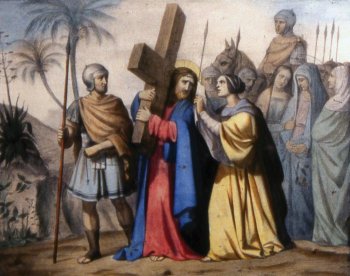
A Reading from the Book of Psalms 27:8-9
Of you my heart has spoken: "Seek his face." It is your face, O Lord, that I seek; hide not your face. Dismiss not your servant in anger; you have been my help. Do not abandon or forsake me, O God my help!
Veronica sought you in the midst of the crowd. She sought you and finally found you. While your anguish was at its height, she wanted to ease it by wiping your face with a towel. A small gesture, but it expressed all her love for you and all her faith in you; it has remained impressed on the memory of our Christian tradition.
Lord Jesus,
it is your face that we seek.
Veronica reminds us that you are present
in every person who suffers
and goes forward along his or her path to Golgotha.
Lord, grant that we may find you in the poor,
in the least of your brethren,
in order to wipe away the tears of those who weep,
to take care of those who suffer
and to support those who are weak.
Lord, you teach us
that a wounded and forgotten person
loses neither worth nor dignity
and remains a sign
of your hidden presence in the world.
Help us to wipe away from his or her face
the marks of poverty and injustice,
so that your image in him or her
may be revealed and may shine forth.
We pray for those who are seeking your Face
and who find it in those of the homeless,
the poor and children exposed to violence and exploitation.
Amen.
VII Station: Jesus falls for the second time
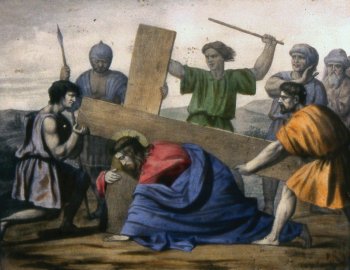
A Reading from the Book of Psalms 22:8,12
All who see me deride me. They curl their lips, they toss their heads. Do not leave me alone in my distress; come close, there is none else to help.
Jesus is alone under the interior and exterior weight of the Cross. In this fall, the weight of evil becomes too great and there seems no longer to be any limit to injustice and violence.
But he rises once more, strong in the infinite trust that he places in his Father. Before the men who abandon him to his lot, the power of the Spirit raises him up; it unites him fully to the Father’s will, that of love which can do all things.
Lord Jesus, in your second fall,
we recognize so many of our situations
from which there seems to be no way of escape.
Among them are those that derive from prejudice and hatred,
which harden our hearts
and lead to religious conflicts.
Enlighten our minds
so that they recognize,
despite "human and religious differences,"
that "a ray of truth
shines on all men and women",
called to walk together
– with respect for religious freedom –
towards the truth that is in God alone.
Thus, the different religions can
"join one another in service to the common good
and contribute to the development of each person
and the building of society" (Ecclesia in Medio Oriente, 27-28).
Come, Holy Spirit,
to console and strengthen Christians,
especially those from the Middle East,
so that, united in Christ,
they may be witnesses of your universal love
in an area torn apart by injustice and conflicts.
Amen.
VIII Station: Jesus meets the women of Jerusalem who weep for him
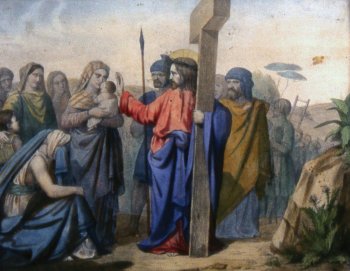
A Reading from the Holy Gospel according to Luke 23:27-28
There followed him a great multitude of the people, and of women who bewailed and lamented him. But Jesus turning to them said, "Daughters of Jerusalem, do not weep for me, but weep for yourselves and for your children."
On the path to Calvary, the Lord meets the women of Jerusalem. These women are weeping at the Lord’s sufferings as if it were suffering without hope. All they can see in the Cross is the wood, sign of a curse (cf. Dt 21:23), whereas the Lord chose it as a means of Redemption and Salvation.
In the Passion and Crucifixion, Jesus gives his life as a ransom for many. Thus he gave relief to those who were oppressed under the yoke and he consoled the afflicted. He wiped away the tears of the women of Jerusalem and opened their eyes to Paschal truth.
Our world is full of afflicted mothers, of women whose dignity has been wounded, abused by discrimination, injustice and suffering (cf. Ecclesia in Medio Oriente, 60). O suffering Christ, be their peace and be a balm to their wounds.
Lord Jesus,
by your incarnation from Mary,
"Blessed among women" (Lk 1:42),
you raised the dignity of every woman.
With the Incarnation
you unified the human race (cf. Gal 3:26-28).
Lord,
may the encounter with you be the desire of our hearts.
Let our path, filled with sufferings,
always be a path of hope,
with you and towards you
who are the refuge of our life
and our Salvation.
Amen.
IX Station: Jesus falls for the third time under the weight of the Cross
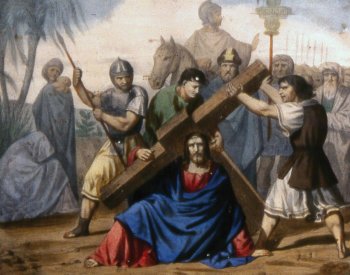
A Reading from the Second Letter of Saint Paul to the Corinthians 5:14-15
The love of Christ controls us, because we are convinced that one has died for all; therefore all have died. And he died for all, that those who live might live no longer for themselves but for him who for their sake died and was raised.
For the third time Jesus falls under the Cross, burdened with our sins, and for the third time he seeks to get up again, summoning up the strength that remains to him, so as to continue his journey towards Golgotha, refusing to let himself be crushed and to succumb to temptation.
From the moment of his Incarnation, Jesus carries the Cross of human suffering and sin. He has fully and eternally assumed human nature, showing men that victory is possible and that the path towards divine sonship is open.
Lord Jesus,
the Church, born from your open side,
is oppressed under the Cross of the divisions
that distance Christians from one another
and from the unity that you willed for them;
they turn away from your desire
"that they may all be one" (Jn 17:21)
as the Father is with you.
This cross bears down with all its weight
on their lives and on their common testimony.
Grant us, Lord, the wisdom and the humility
to rise once more and to move forward along the path of unity,
in truth and love,
without succumbing to the temptation
to have recourse merely to the criteria
of personal or sectarian interests,
in the face of our divisions (cf. Ecclesia in Medio Oriente, 11).
Grant that we may renounce the mentality of division,
"lest the Cross of Christ be emptied of its power" (1 Cor 1:17).
Amen.
X Station: Jesus is stripped of his garments
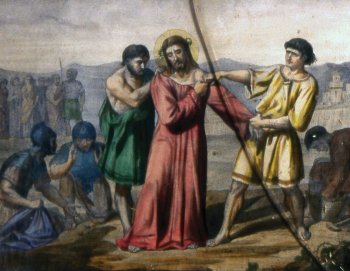
A Reading from the Book of Psalms 22:19
They divide my clothing among them, they cast lots for my robe.
In the fullness of time, Lord Jesus, you clothed yourself in our humanity, you whose "train filled the temple" (Is 6:1); already, you are walking in our midst, and those who wish to touch the hem of your garments are healed. But you have been stripped even of this garment, Lord! They have stolen your cloak and you have also given us your tunic (cf. Mt 5:40). You have allowed the veil of your flesh to be torn so that we might once more be admitted into the Father’s presence (cf. Heb 10:19-20).
We thought we could find fulfilment by ourselves, independently of you (cf. Gen 3:4-7). We found ourselves naked, but in your infinite love you reclothed us with the dignity of sons and daughters of God and of his sanctifying grace.
Bestow, Lord, upon the children of the Eastern Churches – stripped by various difficulties, sometimes to the point of persecution, and weakened by emigration – the courage to remain in their countries to proclaim the Good News.
O Jesus, Son of Man,
who were stripped so as to reveal to us
the new creation raised from the dead,
tear in us the veil that separates us from God
and weave in us your divine presence.
Grant us to conquer fear
before the events of life
that strip us and leave us naked,
and to put on the new man of our Baptism,
in order that we may announce the Good News,
proclaiming that you are the only true God
who guides history.
Amen.
XI Station: Jesus is nailed to the Cross
A Reading from the Holy Gospel according to John 19:16a,19
Then he handed him over to them to be crucified. Pilate also wrote a title and put it on the cross; it read: "Jesus of Nazareth, the King of the Jews."
Behold, the long-awaited Messiah, hanging on the wood of the cross between two thieves. The two hands which blessed humanity are pierced. The two feet which trod our earth to proclaim the Good News are now suspended between earth and heaven. The eyes full of love, whose gaze healed the sick and forgave our sins, now gaze only heavenward.
Lord Jesus,
you were crucified for our sins.
You pray to God the Father and you intercede for humanity.
Each hammer blow echoes like a beat of your immolated heart.
How beautiful upon the mount of Calvary
are the feet of the One who proclaims
the Good News of salvation.
Your love, Jesus, has filled the universe.
Your pierced hands
are our refuge in distress.
They embrace us
whenever the abyss of sin threatens us,
and in your wounds
we find healing and forgiveness.
O Jesus,
we pray to you for all those young people
who are overcome by hopelessness,
for young people who are the victims of drugs,
of sects and of perversions.
Free them from their enslavement.
May they lift up their gaze and accept Love.
May they find happiness in you;
save them, our Saviour.
Amen.
XII Station: Jesus dies on the cross
A Reading from the Holy Gospel according to Luke 23:46
Then Jesus, crying with a loud voice, said: "Father, into your hands I commend my spirit." And having said this, he breathed his last.
From the height of the cross a cry is heard a cry: a cry of abandonment at the moment of death, a cry of trust amid suffering, a cry accompanying the birth of a new life. Behold, hanging on the tree of life, you deliver your spirit into your Father’s hands, causing life to spring up in abundance and forming the new creation. Today we too face the challenges of this world: we sense the surge of fears which overwhelm us and shake our trust. Grant us, Lord, the strength to know deep within our heart that no death will conquer us, until we rest in the hands which have shaped us and accompany us.
May every one of us be able to cry out:
"Yesterday I was crucified with Christ,
today I am glorified with him.
Yesterday I died with him,
today I live with him.
Yesterday I was buried with him.
Today I have risen with him." (Gregory Nazianzen)
In the darkness of our nights,
we contemplate you.
Teach us to turn towards the Most High,
your heavenly Father.
Today, let us pray
that all those who promote abortion
may become aware that love
can only be a source of life.
Let us think also of those who defend euthanasia
and those who encourage
techniques and procedures
which endanger human life.
Open their hearts
to know you in the truth
and to work for the building
of the civilization of life and love.
Amen.
XIII Station: Jesus is taken down from the cross and given to his Mother
A Reading from the Holy Gospel according to John 19:26-27a
When Jesus saw his mother, and the disciple whom he loved standing near, he said to his mother: "Woman, behold your son!" Then he said to the disciple: "Behold, your mother!"
Lord Jesus, those who love you remain at your side and keep faith. In the hour of your agony and death, when the world believes that evil triumphs and that the voice of truth, love, justice and peace is silent, their faith does not fail.
O Mary, into your hands we place our earth. "How sad it is to see this blessed land suffer in its children, who relentlessly tear one another to pieces and die!" (Ecclesia in Medio Oriente, 8). It seems that nothing can overcome evil, terrorism, murder and hatred. "Before the cross on which your Son stretched out his sinless hands for our salvation, O Virgin, we fall prostrate this day: grant us peace" (Byzantine liturgy).
Let us pray
for the victims of the wars and of the violence
which in our days devastate
various countries in the Middle East,
as well as other parts of the world.
Let us pray that the displaced and the forced migrants
may soon return
to their homes and lands.
Grant, Lord,
that the blood of innocent victims
may be the seed of a new East,
ever more fraternal, peaceful and just,
and that this East
may recover the splendour of its vocation
as the cradle of civilization and of spiritual and human values.
Star of the East,
show us the coming of the Dawn!
Amen.
XIV Station: Jesus is laid in the tomb
A Reading from the Holy Gospel according to John 19:39-40
Nicodemus also, who had at first come to him by night, came bringing a mixture of myrrh and aloes, about a hundred pounds weight. They took the body of Jesus, and bound it in linen cloths with the spices, as is the burial custom of the Jews.
Nicodemus receives the body of Christ, he looks after it and puts it in a tomb in the middle of a garden which evokes the garden of Creation. Jesus lets himself be buried, even as he let himself be crucified, in the same abandonment, entirely "delivered" into the hands of men and "perfectly united" to them, "even to sleeping beneath the tombstone" (Saint Gregory of Narek).
To accept difficulties, painful events, death, demands steadfast hope, living faith.
The stone placed before the entrance of the tomb will be overturned and a new life will arise. For "we were buried with him by baptism into death, so that as Christ was raised from the dead by the glory of the Father, we too might walk in newness of life." (Rom 6:4)
We have received the freedom of the children of God, so that we will not return to slavery; life has been given to us in abundance, so that we will no longer be satisfied with a life lacking beauty and meaning.
Lord Jesus,
make us children of the light
who do not fear the darkness.
We pray to you today
for all those who search for meaning in life
and for all those who have lost hope,
that they may have faith in your victory
over sin and death.
Amen.





